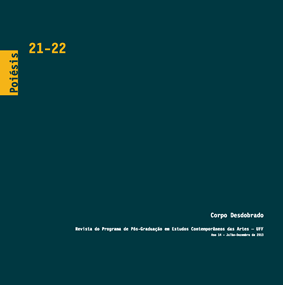O Minimalismo e a experiência psicodélica
DOI:
https://doi.org/10.22409/poiesis.1421-22.177-188Palavras-chave:
minimalismo, psicodelismo, arte contemporâneaResumo
Neste artigo estabeleceremos comparações entre a experiência
psicodélica e o Minimalismo através do pensamento de Georges
Didi-Huberman em seu livro O que vemos, o que nos olha, onde o autor
expõe os limites da idealizada tautologia minimalista, pois, como afirma,
a ilusão se contenta com pouco e, assim sendo, as aspirações literais do
objeto minimalista são frustradas por nossa capacidade associativa e imaginativa, além de tornarem presentes aspectos experienciados através do estado psicodélico.
Downloads
Referências
BATCHELOR, David. Minimalismo. Coleção Movimentos da Arte Moderna. 2ª ed. São Paulo: Cosac & Naify, 2001.
DIDI-HUBERMAN, Georges. O que vemos, o que nos olha. Trad. de Paulo Neves. 2ª ed. São Paulo: Editora 34, 2010.
HUXLEY. Aldous. As portas da percepção: Céu e inferno. São Paulo: Globo, 2002.
JOHNSON. Ken. Are You Experienced? How Psychedelic Consciousness Transformed Modern Art. Munique, Londres, Nova York: Prestel, 2011.
MASTERS, Robert E.L.; HOUSTON, Jean. L’art Psychédélique. Paris: Pont Royal / Del Duca / Laffont, 1968.
MASTERS, Robert E.L.; HOUSTON, Jean. The Varieties of Psychedelic Experience: The Classic Guide to the Effects of LSD on the Human Psyche. Rochester: Park Street Press, 2000.
Artigos
BEVERIDGE, Patrick. Color Perception and the Art of James Turrell. Leonardo, v. 33, n. 4, p. 305-313, 2000. Disponível em:
www.jstor.org/stable/1576905>. Acesso em: 01/12/2012.
DALY, Scott. The Ganzfeld as a Canvas for Neurophysiologically Based Artworks. Leonardo, v. 17, n. 3, p. 172-175, 1984. Disponível em: <http://www.jstor.org/stable/1575185>. Acesso em: 19/05/2013.
Downloads
Edição
Seção
Licença
Autores(as) que publicam na Revista Poiésis concordam com os seguintes termos:
- Os(as) autores(as) mantêm os direitos autorais e concedem à revista o direito de primeira publicação. O trabalho é automaticamente licenciado sob a Licença Creative Commons Attribution, o que permite o seu compartilhamento desde que seja feito o reconhecimento da autoria e da publicação inicial nesta revista.
- Os(as) autores(as) têm permissão e são estimulados a distribuir online seu trabalho publicado na Revista Poiésis (em repositórios institucionais ou em sua própria página pessoal), uma vez que isso pode gerar interações produtivas, bem como aumentar o impacto e a citação do trabalho publicado (Veja O Efeito do Acesso Livre).


